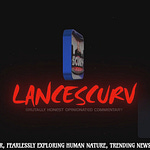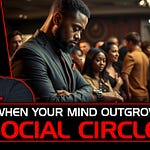Many people in our community are tired, not because of physical work, but because of the constant pressure to act like everything is fine when it is not. There is a heavy expectation to be social, to always show up with a smile, and to be emotionally available to others, even when our own minds are drained. This silent exhaustion is something many of us carry daily, especially Black people who feel the constant need to perform strength, hospitality, and emotional comfort for everyone around us. From family members who expect our time, to friends who demand our energy, to social environments that don’t allow us to be quiet or reserved without judgment, the act of pretending has become a burden that robs us of peace. Instead of being allowed to rest, we are often made to feel guilty for needing space or labeled antisocial when we choose solitude over forced interaction.
This emotional exhaustion is not simply about being around people, but about being around expectations. In our community, we are often taught that love is proven through presence, conversation, and nonstop engagement. But what is rarely discussed is how often this turns into emotional labor where one person gives and everyone else takes. Many are drained because they are expected to be the strong one, the listener, the entertainer, or the encourager. This role-playing creates a fake environment where people laugh even when they are hurting and talk when they have nothing left to say. This kind of pretending is dangerous because it keeps us disconnected from our true selves and steals the chance for honest healing.
The pressure to socialize and show excitement even when we are mentally tired is a direct result of unspoken emotional rules passed down through generations. There is a fear of being judged as cold, unfriendly, or prideful if we choose silence or decline an invitation. However, the truth is that many of us are not tired of people—we are tired of being forced to perform for them. This fake socializing is not community; it is a drain. Real community allows rest, silence, and understanding without punishment. It is time we create spaces where people can just exist without needing to entertain others or sacrifice their peace.
One solution is to set real boundaries and normalize them. Boundaries are not disrespect—they are protection. Black people must begin to say, “I need rest,” and not follow it with an apology or explanation. We must teach our families and friends that needing space does not mean rejection. Another solution is to practice quiet gatherings where people can be in the same space without the pressure to talk. Healing spaces should be based on peace, not performance. When we stop pretending, we make room for honest conversations and emotional clarity. We also protect our mental health by choosing environments that feed our spirit instead of draining it.
The most powerful shift we can make is to stop rewarding fake energy and start valuing authenticity. We should not be clapping for those who overextend themselves to please everyone while losing their mind inside. Instead, we must celebrate rest, reflectiveness, and emotional protection as signs of strength. By allowing ourselves the freedom to be real, we open the door to healthier relationships, stronger mental wellness, and a true sense of community based on love, not expectation. We are not meant to be emotional servants to everyone around us. Our peace is not optional—it is necessary for survival. The time for pretending is over. The time for protecting our spirit has begun.











